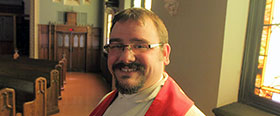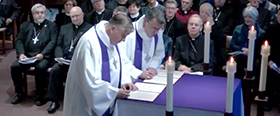Rachel Swenson is spending a year in South Africa as part of the ELCA Young Adults in Global Mission (YAGM) program. In this entry from the blog “YAGM in Southern Africa,” she writes about the missionary concept of accompaniment. To support Rachel or others in the program, please click here.
A quote from Linda Crockett’s “The Deepest Wound”:
“Accompaniment goes beyond solidarity in that anyone who enters into it risks suffering the pain of those we would accompany … . Accompaniment may include all of these actions [protest marches, pressing for changes in law, civil disobedience] but it does not necessarily share the assumption that we can fix, save, or change a situation or person by what we do. It calls for us to walk with those we accompany, forming relationships and sharing risks, joys, and lives. We enter into the world of the one who suffers with no assurance that we can change or fix anything … . Accompaniment is based on hope despite evidence that there is little reason for optimism.”
For those of you who are unaware, accompaniment is YAGM’s buzz word. While my technical job title is missionary of the ELCA, I am not a traditional missionary. The job of the 60 YAGM scattered across the globe is to accompany – to walk with the people in our new communities, to share their sorrows, their victories, their lives for the short time we cross paths. We are not sent to fix, to change, or to rectify. We are sent to live, sent to grieve with our brothers and sisters, sent to find God in seemingly hopeless situations. We are sent to live, sent to dance with grandmothers and teetering toddlers, sent to witness God in all her splendor. We are sent to live, sent to pray with worried teenage girls, questioning church leaders, and God’s most faithful, sent to experience the entirety of God’s creation. We are sent to meet the human race. We are sent to listen to those who may feel voiceless, sent to shoulder some of the weight of impossible burdens if we can and sent to be continually awed and humbled by our experiences within our new homes. We are sent to be filled – with the good and the bad.
There is pain in every corner of this world. Every single person carries their own suffering. To arrive as a stranger with no real understanding, no comprehension of those pains, with the intention of healing that hurt, is as destructive as the mind-sets of the original colonizers. No matter how South African, how Zulu, I become, I will always be an outsider. As an outsider, I will never have the right answers for the pains I see in my community, in my new country. The only thing I can do is accompany. The only thing I can do is love and support and listen when and where I’m called. To try and fix what my community faces wouldn’t be faithful to the beautiful, challenging, complicated, messy reality of South Africa. It’s not easy. Some days it feels nearly impossible. But if doing so means that I can have an hour-long conversation, across differences in language and culture, with my host mom, brother and uncle about the increasingly high levels of teen pregnancy in this country; if doing so means that I get to fall in love with a community that is so wonderfully imperfect; if doing so means that I can learn about the remnants of the apartheid era simply by being a white girl with black friends (which seems to be an oddity in my town), then my struggles and limitations seem insignificant. Instead, I’m faced with a world of possibilities, a latticework of hurts and pains and triumphs and laughter that reaches out and folds me into its tapestry. Each thread leads me to another friendship, heartbreak, or surprising plot twist, but every one is woven together into the exquisite narrative written by the one who really does have all the right answers.











